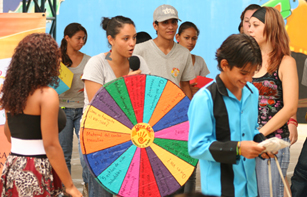
Peer educators providing HIV prevention information during a community fair in Puntarenas.
José is a young AIDS peer educator in the Costa Rican port city of Limon and he is proud to share HIV prevention messages and tips on how to stay healthy with other young people. “It’s really great to see how at the end of a session the group knows more about HIV. We also have a better idea of how to protect ourselves and deal with our relationships more successfully,” he said.
As one of more than 80 peer educators, between the ages of 18 and 24, José is taking part in an ambitious HIV prevention project in the cities of Limon and Puntarenas, which are among the most affected by the virus in Costa Rica. The educators have gone through extensive training and can provide educational and communication materials and tools to their counterparts in a lively and informative way.
The three-year programme which began at the end of 2008 is called Friendly education and health services to promote healthy lifestyles and prevent HIV and AIDS—or Giro 180 for short. Supported by UNAIDS, the programme is managed by its cosponsors the UN Development Programme (UNDP), the UN Children’s Fund (UNICEF), and the UN Population Fund (UNFPA). The UN bodies work alongside the country’s Vice-Ministry of Youth and the National Council on Public Policy for Youth.
It’s really great to see how at the end of a session the group knows more about HIV. We also have a better idea of how to protect ourselves and deal with our relationships more successfully
José, a young AIDS peer educator in Limon, Costa Rica
The peer educators themselves have developed a number of the interventions, including using online games that feature questionnaires on HIV risk and a Facebook page. Youth carnivals and community fairs, board game evenings and artistic, musical and recreational activities are also being used.
“We did a fair in Villa Plata, a very poor place,” said Deiker, a youth promoter in Limon. “We gave out information, played and had fun. We were there, sharing experiences with the boys from morning till evening. And in the end the guys didn’t want to leave.”
As well as providing young people with HIV information and life skills to make informed choices, the project also seeks to build the capacity of healthcare and educational institutions to attain these goals in a protective environment.
Some 73 000 adolescents in the two cities aged between 13 and 18 are the main beneficiaries and young people from around the country are also indirectly benefiting from the political and institutional advocacy and information campaigns launched by the project.
Such information campaigns are vital in a country where a 2008 study carried out by UNFPA and UNICEF, with support from UNAIDS, found that the majority of young people in Costa Rica were sexually active by the age of 16. The same study showed that fewer than 30% of young people in Limon and 17% in Puntarenas knew how to use a condom correctly.
However, things are changing. The programme has led to an increase in commitment from government authorities and decision makers. A number of local and regional institutions, such as the Department of Health in Limon, have committed themselves to broadening youth-friendly HIV services. In Puntarenas, schools have adopted the ‘Giro Junior’ intervention, dedicated to the development of specific strategies to challenge HIV, with guidance and support centers. The regional Ministry of Public Education has also prepared a set of guidelines for HIV prevention in schools, which will be binding throughout the region.
The team spearheading the programme hopes that it will become a flagship model. For at least one of the peer educators, Bizmark from Limon, they are enjoying making waves, “Older people might be a bit scared of us talking so openly, widely and directly. We are changing lives in perhaps the only way people can change, which is having fun while learning.”




